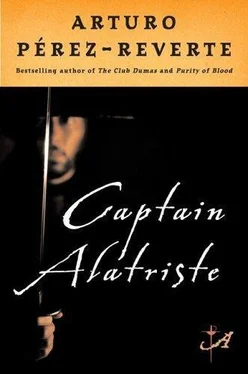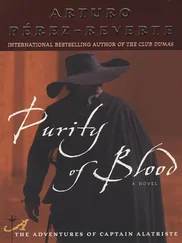Arturo Perez-Reverte - Captain Alatriste
Здесь есть возможность читать онлайн «Arturo Perez-Reverte - Captain Alatriste» весь текст электронной книги совершенно бесплатно (целиком полную версию без сокращений). В некоторых случаях можно слушать аудио, скачать через торрент в формате fb2 и присутствует краткое содержание. Жанр: Старинная литература, на английском языке. Описание произведения, (предисловие) а так же отзывы посетителей доступны на портале библиотеки ЛибКат.
- Название:Captain Alatriste
- Автор:
- Жанр:
- Год:неизвестен
- ISBN:нет данных
- Рейтинг книги:3 / 5. Голосов: 1
-
Избранное:Добавить в избранное
- Отзывы:
-
Ваша оценка:
- 60
- 1
- 2
- 3
- 4
- 5
Captain Alatriste: краткое содержание, описание и аннотация
Предлагаем к чтению аннотацию, описание, краткое содержание или предисловие (зависит от того, что написал сам автор книги «Captain Alatriste»). Если вы не нашли необходимую информацию о книге — напишите в комментариях, мы постараемся отыскать её.
Captain Alatriste — читать онлайн бесплатно полную книгу (весь текст) целиком
Ниже представлен текст книги, разбитый по страницам. Система сохранения места последней прочитанной страницы, позволяет с удобством читать онлайн бесплатно книгу «Captain Alatriste», без необходимости каждый раз заново искать на чём Вы остановились. Поставьте закладку, и сможете в любой момент перейти на страницу, на которой закончили чтение.
Интервал:
Закладка:
San Felipe was the liveliest, noisiest, and most popular spot in Madrid. Its proximity to the Estafeta, the building that housed the royal mails, where letters and notices from the rest of Spain, indeed, the entire world, were received, as well as its location overlooking the principal street of the city, made it an ideal site for the great public party in which opinions and gossip were exchanged, soldiers preened, clergy spread tales, thieves pilfered purses, and poets aired their talent and wit. Lope, Don Francisco de Quevedo, and the Mexican Alarcon, among others, were regulars. Any news, rumor, or lie that originated there rolled like a ball gaining momentum; nothing escaped the tongues that knew everything, that shredded the reputations of everyone from king to lowest of low.
Many years later, Agustin Moreto mentioned San Felipe in one of his plays, when a countryman and a gallant military man meet:
"I see these steps are something you cannot leave!"
"These knowing stones have me bewitched,
My friends and I invariably leave enriched,
For nowhere in all the world have I
Encountered such a fertile ground for lies."
Even the great Don Miguel de Cervantes, may he sit forever at the right hand of God, wrote in his Voyage to Parnassus:
Farewell, San Felipe, the grand paseo,
Where if the Turk descends or the English menace,
I read of it in the gazette of Venice.
I quote these lines that Your Mercies may see just how famous the place was. In its cliques, the state of affairs in Flanders, Italy, and the Indies were argued with the gravity of a meeting of the Council of Castile. Jokes and witticisms were traded; the honor of ladies, actresses, and cuckolded husbands was besmirched; foul obscenities were directed toward the Conde de Olivares; and the amorous adventures of the king spread in whispers' from ear to ear.
It was, all told, a most pleasant and sparkling place, a font of wit, news, and wicked tongues that drew a gathering every morning about eleven. That lasted until the pealing of the church bell one hour after the noontime Angelus had stirred people in the crowd to remove their hats, stand respectfully, then drift away, leaving the field to the beggars, students, slatterns, and ragamuffins waiting for the soup from the charitable Augustinians. The steps came back to life in the evening, at the hour of the rua on Calle Mayor, where rumor-mongers and tale-bearers could watch the passing parade of coaches: fine ladies; women of questionable reputation who gave themselves the airs of ladies; and "schoolgirls" from nearby brothels—there was a notorious one, actually, right across the street—all of them a source of conversation, flirtation, and jest. That lasted until the call to evening prayer, when, after praying with hat in hand, people in the crowd again dispersed until the following day, each to his own home—and God to all of theirs.
I stated earlier that Don Francisco de Quevedo frequented the steps of San Felipe; and in many of his paseos he was accompanied by such friends as Licenciado Calzas, Juan Vicuna, or Captain Alatriste. His fondness for my master was based, among other factors, in practicality. The poet was always involved in quarrels rooted in jealousy and exchanging obscenities with various rivals—something very typical in that day, and in all epochs of this benighted country of ours, with its Cains, calumny, trickery, and envy, where words offended, even maimed, as surely as or more surely than the sword. Some, like Luis de Gongora and Juan Ruiz de Alarcon, were always belittling each other, and not merely for what they wrote.
Gongora, for example, said of Francisco de Quevedo:
Muse that babbles inanities
Can earn no ducats or hope to inspire;
His fingers know better to rob my purse
Than pluck at that unmelodious lyre.
And the next day it would be the other way around. Don Francisco would counterattack with his heaviest artillery:
This Gongora, who blasts a mighty fart,
This acme of vice and fanfaronade,
This asshole, in flesh and also in art,
Is a man even buggerers seek to evade.
And along with these lines, he fired off other verses, as famous as they were ferocious, that flew from one end of the city to another, portraying Gongora as filthy in both body and lineage.
In person—and breeding—so far from clean,
In fact, so precisely the opposite,
That never, as far as I have heard,
Did a word leave his mouth that wasn't shit.
Such sweet sentiments. He also turned out cruel lines aimed at poor Ruiz de Alarcon, whose physical impediment—a hunchback—he loved to deride with pitiless wit.
Sacks of meal on back and chest.
Who's the one with those effects?
Alarconvex!
Such verses circulated anonymously, in theory; but everyone knew perfectly well who had composed them— and with the worst intentions in the world. Naturally, other poets did not hold back: sonnets and decimas flew back and forth. To sharpen his claws, Don Francisco would read his aloud in the mentideros, attacking and counterattacking, his pen dipped in the most corrosive bile. And if he wasn't defiling Gongora or Alarcon, it might be anyone at all; for on those days when the poet woke up spewing vitriol, he fired randomly at anyone who moved.
In regard to those horns you are forced to wear,
Don Whoever You Be, who put them there?
Your unfaithful wife, and if they are trimmed
She will help you grow them all over again!
Lines of that nature. So many that even though Quevedo was courageous, and skillful with the sword, having a man like Diego Alatriste beside him when he strolled among prospective adversaries was comforting for him. And it happened that one morning when Don Francisco was out with Captain Alatriste, Senor Whoever You Be of the sonnet—or someone who saw himself so portrayed, because in God's Madrid the cuckolded walked in double lines—escorted by a friend, came up to seek an explanation on the steps of San Felipe. The matter was resolved at nightfall with a taste of steel behind the wall of Los Recoletos, so thoroughly that both the presumed betrayed husband, as well as the friend—once their respective chest wounds had healed—turned to prose and never looked at a sonnet for the rest of their lives.
That morning on the steps of San Felipe, the general topic of conversation was the Prince of Wales and the infanta, alternating with the latest rumors from court on the war, which was reviving in Flanders. I recall that it was a sunny day, and that the sky was very blue and clean above the roof tiles of the nearby houses, and that the mentidero was a beehive of activity. Captain Alatriste continued to show himself in public without apparent fear—and now the hand that had been bandaged after the affair at the Gate of Lost Souls had healed. That day he was unobtrusive in dark hose, gray breeches, and a doublet fastened to the neck, and although the morning was warm, he was also wearing a cape to cover the grip of the pistol stuck in the back of his belt, in addition to his usual dagger and sword. Unlike most of the veteran soldiers of the period, Diego Alatriste was not fond of colorful adornments or trim, and the only bright note in his ensemble was the red plume in the band of his wide-brimmed hat. Even so, his appearance contrasted with the sobriety of Don Francisco de Quevedo's dark clothing, brightened only by the cross of Santiago showing beneath the short cape, also black, that we called a herreruelo.
Читать дальшеИнтервал:
Закладка:
Похожие книги на «Captain Alatriste»
Представляем Вашему вниманию похожие книги на «Captain Alatriste» списком для выбора. Мы отобрали схожую по названию и смыслу литературу в надежде предоставить читателям больше вариантов отыскать новые, интересные, ещё непрочитанные произведения.
Обсуждение, отзывы о книге «Captain Alatriste» и просто собственные мнения читателей. Оставьте ваши комментарии, напишите, что Вы думаете о произведении, его смысле или главных героях. Укажите что конкретно понравилось, а что нет, и почему Вы так считаете.










